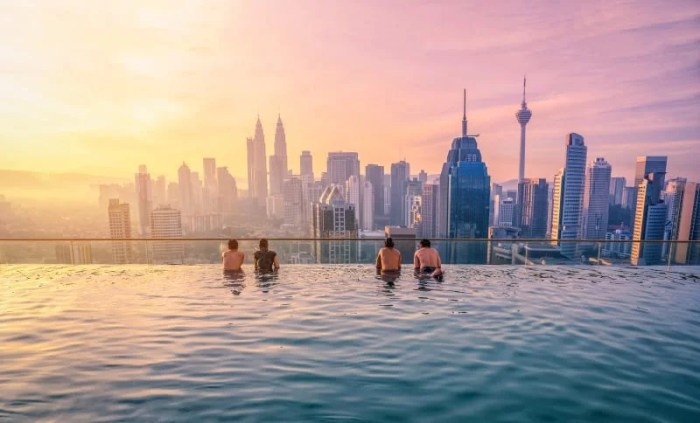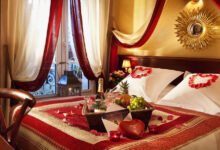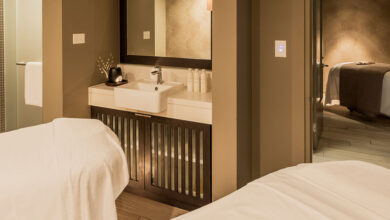Best Malaysian Hotels Diverse Culture & Experiences
Best hotels in Malaysia offering diverse experiences and cultural immersion provide more than just a place to sleep; they offer a journey into the heart of Malaysian culture. From the bustling streets of Kuala Lumpur to the tranquil beaches of Borneo, Malaysia’s diverse landscape is reflected in its hotels, each offering unique experiences designed to immerse you in the local way of life.
This exploration delves into the best hotels that go above and beyond, providing authentic cultural encounters that will leave a lasting impression.
Imagine learning traditional Malaysian cooking techniques from a renowned chef, witnessing a captivating cultural performance in a hotel courtyard, or exploring local markets guided by knowledgeable staff. These are just a few of the enriching experiences awaiting you. We’ll examine the diverse geographic regions, the distinct styles of hotels found in each area, and the specific cultural activities they offer, ensuring you find the perfect hotel to match your desire for a truly immersive Malaysian adventure.
Defining Diverse Experiences and Cultural Immersion in Malaysian Hotels
A diverse experience and cultural immersion in a Malaysian hotel goes beyond simply offering comfortable accommodation. It involves creating an environment that authentically reflects the rich tapestry of Malaysian culture, allowing guests to engage with local traditions, arts, and lifestyles in a meaningful way. This immersion should be seamlessly integrated into the hotel experience, enriching the stay and leaving a lasting impression.Key elements contributing to a uniquely authentic Malaysian experience include the incorporation of local design elements in the hotel’s architecture and décor, the use of locally sourced materials and products, and the offering of cultural activities and amenities.
The staff’s genuine warmth and hospitality, reflecting Malaysian values, further enhances the immersive experience. Authenticity is paramount; the experience shouldn’t feel contrived or staged but rather a natural extension of the local environment.
Types of Cultural Experiences Available in Malaysia
Malaysian culture is a vibrant blend of Malay, Chinese, Indian, and indigenous influences, resulting in a diverse range of cultural experiences. Hotels can offer a variety of these experiences to their guests. These experiences cater to different interests and preferences, ensuring a truly enriching and memorable stay.
- Traditional Arts and Crafts Workshops: Guests can participate in batik painting, weaving, or traditional dance classes, learning about the techniques and the cultural significance behind these practices. Imagine learning the intricate art of batik from a local artisan, creating your own unique piece to take home as a souvenir.
- Culinary Delights: Malaysian cuisine is renowned for its diverse flavors and influences. Hotels can offer cooking classes focusing on specific regional dishes, allowing guests to learn about the ingredients and preparation methods. A tasting menu showcasing the country’s diverse culinary landscape, from spicy curries to delicate desserts, is another option.
- Cultural Performances: Traditional Malaysian dance performances, shadow puppet shows (Wayang Kulit), or gamelan orchestra concerts can provide guests with an engaging insight into the country’s artistic heritage. The atmosphere of a traditional performance, with its vibrant costumes and captivating rhythms, is an unforgettable experience.
- Local Community Interactions: Hotels can arrange visits to local villages or communities, allowing guests to interact with the people, learn about their daily lives, and experience their traditions firsthand. This could involve visiting a local market, participating in a traditional ceremony, or simply having tea with a local family.
- Historical Site Visits: Malaysia boasts a rich history, with ancient ruins, colonial buildings, and significant historical sites. Hotels can organize guided tours to these locations, providing guests with a deeper understanding of the country’s past. Imagine exploring the majestic Batu Caves or the historical streets of Melaka, learning about their significance from a knowledgeable guide.
Geographic Regions and Hotel Styles

Source: murai.my
Malaysia’s diverse geography and rich cultural tapestry are beautifully reflected in its hotel offerings. From bustling cityscapes to tranquil beaches and lush rainforests, the country boasts a wide array of accommodation styles catering to every taste and preference. Exploring these regional variations provides a deeper understanding of Malaysia’s unique character and the experiences available to travelers. The following sections will highlight the distinct hotel styles and cultural highlights found in various regions across the country.
Each region of Malaysia offers a unique cultural experience, influencing the architecture, design, and overall ambiance of its hotels. This interplay between geography and culture creates a fascinating spectrum of hospitality options, allowing travelers to fully immerse themselves in the local way of life.
Regional Hotel Styles and Cultural Highlights
The following table provides a snapshot of the diverse hotel styles and cultural experiences found across Malaysia’s major regions. Note that this is not an exhaustive list, and many hotels blend multiple styles.
| Region | Hotel Style | Cultural Highlight | Example Hotel Name |
|---|---|---|---|
| Kuala Lumpur | Modern, Luxury High-Rise | Vibrant city life, mix of cultures, colonial architecture | The Ritz-Carlton, Kuala Lumpur |
| Penang | Colonial, Boutique, Heritage | Straits Chinese culture, street art, colonial history | Eastern & Oriental Hotel |
| Borneo (Sabah & Sarawak) | Eco-lodges, Rainforest Retreats, Resort Hotels | Indigenous cultures, wildlife, rainforest landscapes | Shangri-La Rasa Ria Resort & Spa (Sabah) |
| Langkawi | Beachfront Resorts, Luxury Villas | Island life, duty-free shopping, stunning beaches | The Datai Langkawi |
| Melaka | Boutique, Heritage, Colonial | Historical sites, Baba-Nyonya culture, vibrant street food scene | Casa del Rio Melaka |
Cultural Immersion Activities Offered by Hotels
Malaysian hotels go beyond simply providing a bed and breakfast; many actively curate experiences designed to immerse guests in the rich tapestry of Malaysian culture. These range from hands-on workshops to performances showcasing the nation’s artistic heritage, offering a deeper understanding and appreciation of the country beyond the typical tourist trail. The level of immersion varies depending on the hotel’s brand, location, and target market, but the overall aim is to create memorable and authentic encounters.Many hotels partner with local artisans and communities to ensure the authenticity of their cultural programs.
This collaborative approach not only benefits guests but also supports the preservation and promotion of Malaysian traditions. The experiences offered are often designed to be interactive and engaging, allowing guests to actively participate rather than passively observe.
Malaysia boasts incredible hotels offering diverse experiences, from luxurious resorts to charming boutique stays, allowing for deep cultural immersion. If you’re looking for a different kind of adventure, consider checking out the options for Hotels in Kowloon with convenient access to Hong Kong Disneyland before returning to explore the rich tapestry of Malaysian culture and hospitality. Ultimately, both destinations promise unforgettable travel memories.
Types of Cultural Immersion Programs Offered by Different Hotel Chains
Different hotel chains in Malaysia approach cultural immersion with varying focuses and styles. Luxury brands might offer more exclusive and personalized experiences, such as private cooking classes with renowned chefs or exclusive access to cultural performances. Mid-range hotels may focus on group activities like batik painting workshops or visits to local villages, providing a more accessible entry point to cultural exploration.
Malaysia boasts incredible hotels offering diverse cultural experiences, from luxurious stays in colonial-era buildings to eco-lodges nestled in rainforests. Many prioritize sustainability, even in their construction, often incorporating innovative materials like those detailed in this guide on Sustainable roofing materials to minimize their environmental impact. This commitment to eco-consciousness enhances the overall experience, allowing you to enjoy the rich Malaysian culture while feeling good about your travel choices.
Budget-friendly options might incorporate cultural elements into their existing offerings, such as themed dinners or showcasing local crafts in their lobbies. For example, a luxury hotel might offer a private Wayang Kulit (shadow puppet) performance in a beautifully appointed setting, while a mid-range hotel could organize a group visit to a batik factory with a hands-on workshop. The scale and exclusivity differ, but the underlying goal of cultural engagement remains consistent.
Diverse Cultural Activities and Their Associated Benefits
The following list showcases a range of cultural activities offered by Malaysian hotels and the benefits they provide to guests:
- Malaysian Cooking Classes: Learn to prepare iconic dishes like Nasi Lemak or Char Kway Teow. Benefit: Develop culinary skills and gain a deeper understanding of Malaysian cuisine and its diverse flavors.
- Traditional Dance Performances: Witness captivating performances of traditional dances like Joget, Zapin, or Mak Yong. Benefit: Experience the artistry and grace of Malaysian dance, learning about its history and cultural significance.
- Batik Painting Workshops: Create your own unique batik artwork using traditional techniques. Benefit: Learn a traditional Malaysian craft and take home a personalized souvenir reflecting your experience.
- Local Market Visits: Explore bustling local markets like Central Market Kuala Lumpur or Pasar Seni. Benefit: Immerse yourself in the vibrant atmosphere of a local market, interact with vendors, and discover unique souvenirs and local produce.
- Traditional Music Performances: Enjoy the sounds of Gamelan, a traditional ensemble music. Benefit: Appreciate the unique sounds and rhythms of Malaysian traditional music and its cultural context.
- Village Visits: Explore rural communities and learn about their way of life. Benefit: Gain a deeper understanding of Malaysian rural life and traditions, fostering cultural exchange and appreciation.
- Wayang Kulit (Shadow Puppet) Shows: Experience the ancient art of shadow puppetry. Benefit: Witness a unique form of storytelling, gaining insight into Malaysian folklore and mythology.
- Tea Ceremony: Participate in a traditional Malaysian tea ceremony. Benefit: Learn about the etiquette and cultural significance of tea drinking in Malaysia.
Hotel Amenities and Services Enhancing Cultural Experiences
Malaysian hotels are increasingly recognizing the importance of incorporating local culture into their offerings to provide guests with a truly immersive and memorable experience. Beyond simply showcasing Malaysian art and crafts, the most successful hotels actively integrate cultural elements into their amenities and services, creating a holistic and authentic experience that resonates with visitors. This integration goes beyond superficial decoration; it’s about creating an environment and providing services that genuinely reflect the spirit and traditions of Malaysia.The thoughtful design and implementation of hotel amenities play a crucial role in enhancing cultural immersion.
By carefully selecting and arranging these elements, hotels can create a palpable sense of place and encourage guests to engage more deeply with Malaysian culture. This extends beyond the aesthetic; the way services are delivered, and the overall atmosphere created also contribute significantly to the cultural immersion.
Traditional Décor and Local Art Displays
Hotels often utilize traditional Malaysian décor to create an atmosphere that transports guests to a different time and place. This can involve incorporating traditional Malay motifs, batik patterns, intricately carved wooden furniture, and other elements reflective of Malaysia’s rich artistic heritage. For instance, the use of handcrafted textiles on bed linens and furniture upholstery instantly elevates the aesthetic and offers a tactile experience of Malaysian craftsmanship.
Similarly, displaying local art, including paintings, sculptures, and traditional crafts, not only adds visual interest but also provides guests with an opportunity to learn about Malaysian artistic traditions. These displays should ideally be accompanied by information cards providing context and background on the artwork and the artists. The strategic placement of these pieces within the hotel’s common areas and guest rooms can subtly, yet effectively, immerse guests in the local culture.
Exploring Malaysia’s best hotels offers incredible cultural immersion, from bustling city stays to tranquil rainforest retreats. Choosing the right hotel often depends on the desired experience, much like selecting the perfect exterior paint for your home; you’ll want to consider factors like durability and aesthetics, just as you would when researching Best exterior paint brands.
Ultimately, finding the ideal hotel, just like the perfect paint, enhances your overall enjoyment and creates lasting memories.
Multilingual Staff and Personalized Service
The role of hotel staff in providing authentic cultural experiences cannot be overstated. Multilingual staff, capable of communicating in Malay, English, and potentially other relevant languages, facilitate smoother interactions and enhance guest comfort. Beyond language skills, staff training on Malaysian culture, traditions, and etiquette allows them to provide personalized recommendations and insights that go beyond a typical tourist experience.
For example, a staff member knowledgeable about local customs might suggest authentic Malaysian restaurants, guide guests on appropriate attire for visiting certain sites, or offer advice on participating in cultural events. Hotels that invest in comprehensive staff training are better positioned to offer genuinely enriching and personalized cultural experiences.
Examples of Hotels Excelling in Cultural Integration
Several Malaysian hotels have successfully integrated cultural elements into their services. The Datai Langkawi, for example, is renowned for its commitment to sustainability and its integration of local artistry and design within its luxurious accommodations. The hotel’s architecture blends seamlessly with the surrounding rainforest, and its décor incorporates locally sourced materials and traditional craftsmanship. Similarly, the Eastern & Oriental Hotel in Penang, a heritage hotel, maintains its colonial charm while showcasing Malaysian art and culture through its décor, curated exhibitions, and cultural events.
These hotels demonstrate how a commitment to cultural authenticity can enhance the guest experience and create a unique brand identity. They show that cultural integration isn’t just about aesthetics; it’s about creating an atmosphere where guests feel welcomed, understood, and genuinely connected to the local culture.
Guest Testimonials and Reviews
Guest testimonials offer invaluable insights into the actual experiences of visitors, providing a genuine reflection of the cultural immersion offered by Malaysian hotels. These reviews, sourced from various online platforms and hotel guest books, reveal the success (or shortcomings) of hotels in creating authentic and memorable cultural encounters for their guests. Analyzing these testimonials allows us to understand which aspects of cultural immersion resonate most with travelers and identify areas for potential improvement.Exploring a diverse range of guest feedback reveals a common thread: the success of cultural immersion hinges on the authenticity and integration of local culture into the hotel experience, not just as a superficial add-on.
Cultural Immersion Through Culinary Experiences
Many guests highlighted the positive impact of culinary experiences on their cultural immersion. For example, one guest at the Eastern & Oriental Hotel in Penang described a cooking class as “a truly unforgettable experience. Learning to prepare authentic Malaysian dishes, alongside a local chef, was far more enriching than simply eating the food. It felt like a genuine connection to the local culture.” Another guest at a resort in Langkawi recounted a similar experience, stating, “The private dinner with a local family was the highlight of my trip.
We learned about their traditions and shared stories over delicious home-cooked food. It felt incredibly authentic and personal.” These testimonials underscore the effectiveness of hands-on culinary activities in fostering cultural understanding.
Malaysia boasts incredible hotels offering diverse cultural experiences, from luxurious resorts to charming boutique stays. Thinking about the design, you might appreciate the clean lines and minimalist aesthetic often found in Scandinavian house design exterior , a style that contrasts beautifully with the vibrant Malaysian architecture. Many Malaysian hotels cleverly incorporate local design elements, creating unique and memorable stays for travelers.
Cultural Immersion Through Local Interactions
Several reviews focused on the positive impact of interactions with local staff and community members. One guest at a boutique hotel in Kuala Lumpur wrote, “The staff were incredibly friendly and knowledgeable about Malaysian culture. They went above and beyond to share their insights and recommendations, making me feel truly welcomed.” Another guest staying at a heritage hotel in Melaka praised the hotel’s efforts in supporting local artisans, stating, “The opportunity to meet and interact with local artisans, who demonstrated traditional crafts, was fascinating.
It added a unique dimension to my stay.” These experiences demonstrate the importance of genuine human interaction in creating meaningful cultural immersion.
Cultural Immersion Through Cultural Performances and Events
Guests also appreciated opportunities to experience traditional Malaysian arts and performances. A review of a resort in Sabah mentioned a captivating traditional dance performance, stating, “The cultural show was breathtaking! The costumes, music, and storytelling were incredibly impressive. It was a truly immersive experience that provided a deep appreciation for Malaysian culture.” Another guest at a hotel in Sarawak highlighted the value of attending a local festival, commenting, “The hotel arranged for us to attend a local festival, which was an incredible opportunity to witness the vibrant culture firsthand.
It was a truly memorable experience.” These testimonials emphasize the importance of providing access to authentic cultural events and performances.
Overall Guest Satisfaction with Cultural Immersion
Overall, guest satisfaction with cultural immersion programs is high. The overwhelming majority of reviews praise the authenticity and effectiveness of the initiatives undertaken by Malaysian hotels. However, some reviews suggest that improvements could be made in terms of providing more detailed information about cultural activities and ensuring that these experiences are accessible to all guests. The key to success seems to lie in creating genuinely immersive experiences that go beyond superficial interactions and offer authentic encounters with Malaysian culture and its people.
Visual Representation
Visuals play a crucial role in conveying the cultural richness of Malaysian hotels, enhancing the guest experience and leaving a lasting impression. The careful integration of traditional Malaysian design elements within modern luxury hotel settings creates a unique and memorable atmosphere. The following examples illustrate how hotels effectively showcase Malaysia’s vibrant culture through visual storytelling.
Traditional Malaysian Architecture in Luxury Hotels
Imagine stepping into a luxurious hotel lobby, where soaring ceilings are adorned with intricate wooden carvings, reminiscent of traditional Malay palaces. Rich, warm tones of mahogany and dark teak dominate, punctuated by pops of vibrant color from hand-woven textiles and intricately patterned tiles. The air is filled with the subtle scent of sandalwood and polished wood. Large, arched windows, perhaps framed with ornate latticework, allow natural light to flood the space, illuminating the elegant furniture crafted from locally sourced timber.
The overall ambiance is one of sophisticated elegance, seamlessly blending traditional Malaysian aesthetics with modern luxury. The use of natural materials like bamboo and rattan, alongside carefully chosen artwork depicting scenes from Malaysian folklore, further reinforces the cultural theme.
Malaysia boasts incredible hotels offering diverse experiences, from luxurious resorts to charming boutique stays, each promising a unique cultural immersion. For those wanting iconic city views, consider staying in Kuala Lumpur; finding a hotel with easy access to the Petronas Twin Towers is simple, check out this helpful list of options: Hotels in Kuala Lumpur with easy access to Petronas Twin Towers.
This prime location lets you easily explore the city’s vibrant culture before continuing your Malaysian adventure at other amazing hotels throughout the country.
Traditional Malaysian Cultural Performances
Picture a tranquil hotel courtyard, bathed in the warm glow of lanterns at dusk. A traditional Malaysian cultural performance unfolds before you. The performers, dressed in exquisitely detailed costumes – women in vibrant batik sarongs and flowing silks, men in intricately woven songket jackets – move with grace and precision. The rhythmic beat of gamelan music, with its distinctive xylophones and gongs, fills the air, creating a captivating atmosphere.
Malaysia boasts incredible hotels offering diverse experiences, from luxurious resorts to charming boutique stays. For a unique cultural immersion, consider hotels showcasing stunning colonial architecture; some even resemble the elegance of a Victorian house exterior , offering a glimpse into Malaysia’s rich history. These hotels often blend old-world charm with modern amenities, providing a truly memorable stay.
The courtyard itself might be adorned with lush tropical foliage, providing a natural backdrop that complements the performance. The colors of the costumes – deep reds, golds, and blues – are visually stunning against the muted tones of the courtyard’s architecture, creating a truly immersive experience.
Malaysian Cooking Classes in Hotel Kitchens
A bustling hotel kitchen becomes a vibrant hub of activity during a Malaysian cooking class. The air is alive with the aroma of exotic spices – lemongrass, galangal, ginger, and chilies – mingling with the savory scents of simmering curries and frying noodles. Guests, clad in aprons, enthusiastically chop vegetables with gleaming cleavers, their movements guided by the experienced chef.
A colorful array of fresh ingredients – vibrant green chilies, fragrant herbs, and a dazzling display of tropical fruits – adorns the kitchen counters. Traditional Malaysian cooking tools, such as woks and mortar and pestles, are used alongside modern appliances. The interaction between the chef and the guests is lively and engaging, creating a fun and educational atmosphere.
The final product – a delicious spread of Malaysian dishes – is a testament to the class’s success, leaving guests with a deeper appreciation for the country’s culinary heritage.
Sustainability and Cultural Preservation in Malaysian Hotels
Malaysian hotels are increasingly recognizing the vital link between responsible tourism, environmental sustainability, and the preservation of rich local cultures. By embracing sustainable practices and actively engaging with local communities, these hotels not only minimize their environmental footprint but also contribute to the long-term well-being of the destinations they serve. This approach benefits both the environment and the cultural heritage of Malaysia, ensuring that future generations can also enjoy these unique experiences.The integration of sustainability and cultural preservation is not merely a trend but a crucial aspect of responsible tourism in Malaysia.
Hotels are finding innovative ways to minimize their impact on the environment while simultaneously enriching the cultural experiences offered to their guests. This involves a holistic approach that encompasses waste management, energy conservation, water efficiency, and the sourcing of local and sustainable products. Furthermore, active participation in community development projects ensures that the benefits of tourism are shared equitably, contributing to the preservation of traditional crafts, arts, and knowledge.
Examples of Hotels Engaging in Community Development and Cultural Preservation, Best hotels in Malaysia offering diverse experiences and cultural immersion
Many Malaysian hotels actively participate in initiatives that support local communities and preserve cultural heritage. For example, some hotels partner with local artisans to showcase and sell their handcrafted products, providing a sustainable income stream for these communities and offering guests unique souvenirs. Others organize cultural workshops for guests, allowing them to learn traditional crafts like batik making or weaving, directly supporting local artisans and preserving traditional skills.
Several resorts also support local schools and community projects, contributing to education and infrastructure development. These partnerships are not only beneficial to the communities but also enhance the guest experience, providing a more authentic and meaningful interaction with Malaysian culture.
The Impact of Responsible Tourism on the Preservation of Malaysian Culture
Responsible tourism practices significantly contribute to the preservation of Malaysian culture. By supporting local communities and businesses, hotels ensure the continued practice of traditional arts, crafts, and customs. This prevents the erosion of cultural heritage that can occur when tourism focuses solely on economic gain without considering its social and environmental consequences. For instance, the preservation of traditional music, dance, and storytelling is directly linked to the economic viability of these practices through tourism.
Hotels that incorporate these elements into their guest experiences create a demand for these cultural expressions, ensuring their survival and transmission to future generations. Furthermore, the responsible management of natural resources and the protection of biodiversity directly impact the cultural landscapes that are integral to many Malaysian communities. Sustainable practices contribute to maintaining the beauty and integrity of these environments, ensuring the continuation of cultural practices linked to them.
Epilogue: Best Hotels In Malaysia Offering Diverse Experiences And Cultural Immersion
Experiencing Malaysia’s rich culture doesn’t just involve visiting iconic landmarks; it’s about connecting with the heart of the nation. The best hotels in Malaysia understand this, actively integrating cultural immersion into every aspect of your stay. From the traditional décor and multilingual staff to the thoughtfully curated activities and authentic local experiences, these hotels create a truly unforgettable journey. By choosing a hotel committed to cultural preservation and sustainable tourism, you contribute to the ongoing preservation of Malaysia’s vibrant heritage while enjoying an enriching and unforgettable vacation.
Essential FAQs
What’s the best time of year to visit Malaysia for cultural experiences?
Malaysia enjoys a tropical climate, so it’s generally pleasant year-round. However, the dry season (typically June to August) offers the most comfortable weather for outdoor activities.
Are there hotels catering specifically to families with children?
Yes, many hotels offer family-friendly amenities such as kids’ clubs, interconnecting rooms, and special children’s menus. It’s best to check individual hotel websites for specific offerings.
How much does a culturally immersive hotel stay typically cost?
Prices vary greatly depending on the hotel’s location, star rating, and the type of cultural experiences offered. You can find options ranging from budget-friendly guesthouses to luxurious resorts.
What language is most commonly spoken in Malaysian hotels?
While Malay is the national language, English is widely spoken in tourist areas and most hotels. Many hotels also employ staff fluent in other languages.







